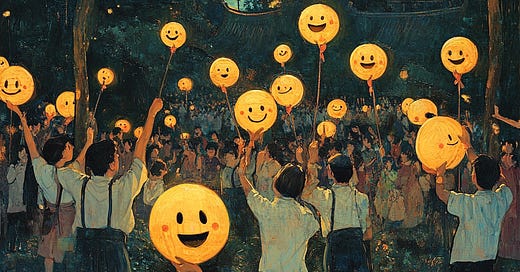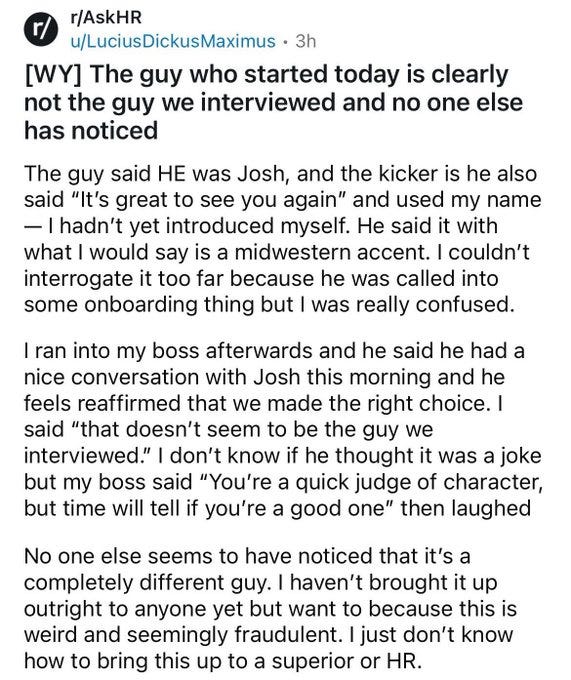Are happy workers the way to better results?
ALSO, DRAMA:"We interviewed someone, but someone else turned up on the first day"
Can happy workers improve your company results?
When it comes to workplace culture should we start by trying to make our workers happy?
That's the opinion of Mark Price, whose 10 years running Waitrose convinced him that the founding philosophy of John Lewis was right.
The original purpose of the John Lewis Partnership was to uphold the happiness of the people who worked inside the organisation - not customers, employees. Mark's work at Waitrose showed him how powerful this approach could be.
I talked to him on the new Eat Sleep Work Repeat. In a fascinating discussion he told me some of the rich stories from his experience at Waitrose. At one stage the business bought the former Somerfield stores inheriting a workforce that was unmotivated and unproductive. There was 75% employee turnover a year for example. By changing the focus the very same stores became some of the best performing in the group, turnover dropped to 17% within months. The happiness philosophy had a number of strands, not least making workers feel like they had a stake in the firm's success.
He describes a vivid story of a former Somerfield store being refit as a Waitrose:
“We'd spent about a million pounds refurbishing the shop. The night before it opened, somebody graffitied in the loos. And so the branch manager got a local painter and decorator to come in and repainted it. The next morning, the store manager put a note on the table saying, somebody graffitied in the loos. I've got a painter and decorator in last night to tidy it. It cost 120 pounds. That means there's 120 pounds less in the bonus to be shared this year”. All of that nonsense stopped.
Mark - and his new firm WorkL - call this Happy Economics.
When I posted Mark’s happiness philosophy on LinkedIn a number of people jumped in saying it was too simplistic. Indeed Mark’s approach is significantly more detailed than that. He outlines a six stage plan, with the following steps.
Reward and recognition
Information sharing
Empowerment
Wellbeing
A sense of pride
Job satisfaction
I found Mark's perspective to be one of the most thorough and convincing approaches to holistically building better culture. I certainly benefitted from re-reading the transcript of this one.
Mark’s book, Happy Economics, is out now.
Mark’s work is certainly adjacent to that of Zeynep Ton. Ton errs on the side of saying that pay plays a bigger part in creating satisfying work conditions for workers. Mark emphasises the equal importance of Reward & Recognition. In Ton’s take, the single most ruinous thing for companies is high employee turnover (quitting), and pay is one of the chief causes of that.
In her recent TED Talk she cites the founder of Costco Jim Sinegal as saying ‘paying your fellow workers well isn’t altruism it’s good business’.
When the CEO of Sam’s Club (a brand of Walmart) introduced significant pay increases they say productivity rose 16% and employee turnover dropped by 25% - these are similar uplifts as shown by the Waitrose work. This is a great partner watch.
Creative work is about putting the hours in, not expecting immediate return. Am I obsessed with pop music? Yes. Do I ever bother this newsletter about it? No. Except today. By far the best the songwriter of the last 2 or 3 years has been the dazzlingly brilliant Amy Allen (recent writing credits include: Sabrina Carpenter ‘Espresso’, Tate McRae ‘Greedy’, Harry Styles ‘Adore you’ and Sabrina Carpenter ‘Taste’). The New York Times gave her her flowers, but what I love is how she articulates how hard creative work is. Allen writes a song a day (normally in a writing room with co-writers or artists). She says she averages 7 songs a week and has done for 7 years.
In the last 7 years that means she’s penned 2500 songs. “And we’re talking about big songs I’ve had — that’s like, what, six? The batting average ain’t strong. But that’s enough to have a career.”
This is very relevant for our own work. In the Eat Sleep Work Repeat podcast episode about creativity Stanford’s Jeremy Utley explains that the best way to stimulate innovation at work is recognising that great ideas aren’t miracle births. To come up with a great idea, we need to accept that we need to create lots and lots of ideas. In Amy Allen’s case being the hottest songwriter in LA means she’s writing one number one a year. Do you really think your first idea is going to be your best?
Grab yourself a cup of something and follow along with the drama below…
(here’s the full Reddit thread)
Three days in is very much becoming the norm of office work in big corporates (if you’re doing better than that then count your blessings, it might not be the case in your next job):






